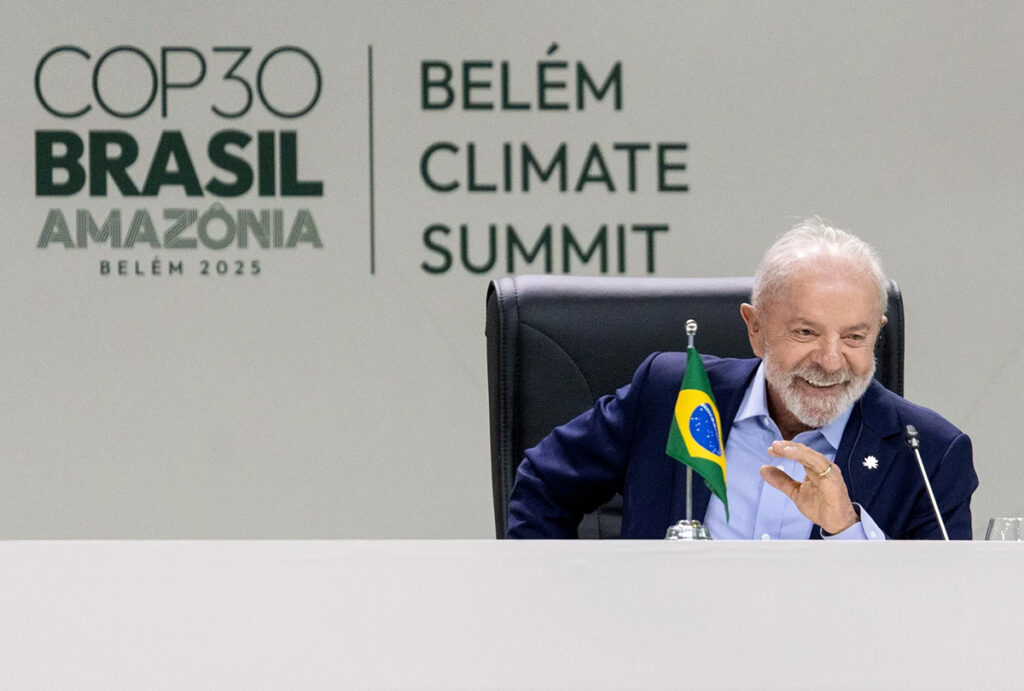By John Ainger

Luiz Inácio Lula da Silva, during the COP30 Leaders Summit on Nov. 6. Photographer: Dado Galdeiri/Bloomberg
The thousands of protesters who brought traffic to a halt Saturday in the Brazilian city of Belém implored leaders to act faster to tackle global warming. As United Nations climate talks enter their critical second week, the next few days will determine whether that call is heeded.
Countries’ climate ministers have arrived at the COP30 summit. They will need to bridge differences over key issues — how to accelerate emissions cuts, provide climate finance and facilitate trade — if they are to reach a deal by Friday. And it’s unclear whether delegates can follow through on a demand made by Brazil’s President Luiz Inácio Lula da Silva for a road map to transition away from fossil fuels.
“I’ve had more conversations about fossil fuel transitioning away at this COP than any other, and now it’s time for ministers to deliver on President Lula’s call,” said Jennifer Morgan, Germany’s former special envoy for climate, in an interview. “If there’s enough political momentum behind it, with enough countries, they’ll find a place to put it.”
The first week was characterized by a conciliatory mood and quick agreement on the agenda. Brazilian negotiators asked for submissions from countries about what they want to get out of COP30 in the form of “love letters,” while meetings were branded “therapy sessions.” But keeping that sense of calm will be challenging as the clock counts down and ministers spar over text.
Brazil, the COP30 host, will need to balance any plan to shift away from oil, gas and coal with other core demands. The negotiating group of Like Minded Developing countries — which includes Saudi Arabia and India — is pushing for developed nations to make more concrete promises on climate finance, while China wants a discussion about unfair trade practices.
Read more: Some Countries Look for a Fossil Fuel Exit Door at COP30
There’s also “significant resistance” to the idea of a fossil fuel road map, COP30 President André Corrêa do Lago told reporters on Friday. Brazil will likely have to wrap the various elements within a final decision, setting the stage for several late-night negotiations until the conference’s scheduled end at 6 p.m. on Friday.
Negotiators for developed countries, who asked not to be identified, said they thought opposition to a road map may be too strong for it to be included in the final outcome, and that work would instead focus on building a coalition of the willing to push ahead with a voluntary process.
“We are entering the political phase,” Liliam Chagas, Brazil’s lead negotiator, said at a press conference. “There are many views about the issues at stake.”
Read more: Who’s Who Inside Negotiating Rooms at the COP30 Climate Summit
There’s little expectation that a fully realized plan on fossil fuels will emerge by Friday. A commitment to discuss it over the next year or longer could be one potential solution. Countries are due for a next round of stock-taking in 2028, which will show just how far off course they are from the Paris Agreement goal of limiting warming to 1.5C and what needs to be done to close the gap.
The hope in some quarters of the UN-administered Blue Zone, where negotiations take place, is that a deal on adaptation finance can be found. An agreement in 2021 to double it to around $40 billion expires at the end of this year, and there’s a push to come up with a new and more ambitious goal for the coming decade. That could potentially unlock more support for curbing fossil fuels.
At an event on Sunday, Brazil’s Environment Minister Marina Silva read out a message from Lula in which he said he will come to Belém on Wednesday with the UN Secretary-General, an intervention that could help break any deadlock.
“We cannot postpone decisions that have been debated for so many years in negotiations, such as just transition and adaptation,” the message read. “We need road maps so that humanity, in a fair and planned way, can overcome its dependence on fossil fuels, halt and reverse deforestation and mobilize resources for these goals.”
Although the Brazilian COP30 presidency was cool to the idea of issuing a so-called cover decision, or a document that sums up the conference’s outcome, there’s already been discussion of a possible mutirão decision — named for a Brazilian word meaning collective effort — to knit together the varied issues.
A summary of negotiations that the presidency published late on Sunday showed that an outcome will be built around acknowledging the progress made in the decade since the Paris Agreement, moving from negotiation to implementation and responding to the urgency of the climate crisis.
Among a plethora of options to accelerate action, the text keeps open the possibility of a road map, though it doesn’t tie it explicitly to exiting fossil fuels.
At the end of week one, Corrêa do Lago emphasized that it’s up to the parties how to proceed. “Next week we are going to have to work in the mutirão spirit, and we really mean it,” he told reporters on Saturday.
But a positive attitude can only go so far when countries disagree and time is short.
“It’s been helpful to give parties that room in a lot of ways,” said David Waskow, director of the World Resources Institute’s International Climate Initiative. “But continuing in that vein — sort of floating in space for too long — would not, in my view, be helpful to landing an agreement at the end.”
— With assistance from Jennifer A Dlouhy, Daniel Carvalho, and Akshat Rathi
Share This:




 CDN NEWS |
CDN NEWS |  US NEWS
US NEWS 
























